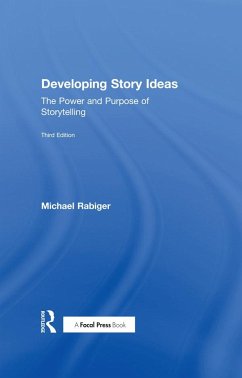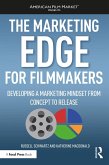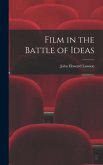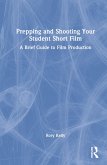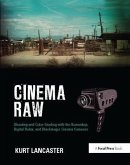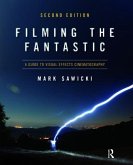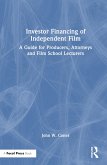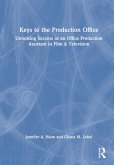- Gebundenes Buch
- Merkliste
- Auf die Merkliste
- Bewerten Bewerten
- Teilen
- Produkt teilen
- Produkterinnerung
- Produkterinnerung
The vast majority of screenplay and writing books that focus on story development have little to say about the initial concept that inspired the piece. Developing Story Ideas: The Power and Purpose of Storytelling, Third Edition provides writers with ideational tools and resources to generate a wide variety of stories in a broad range of forms. Celebrated filmmaker and author Michael Rabiger demonstrates how to observe situations and themes in the writer's own life experience, and use these as the basis for original storytelling. This new edition has been updated with chapters on adaptation,…mehr
Andere Kunden interessierten sich auch für
![The Marketing Edge for Filmmakers The Marketing Edge for Filmmakers]() Russell SchwartzThe Marketing Edge for Filmmakers183,99 €
Russell SchwartzThe Marketing Edge for Filmmakers183,99 €![Film in the Battle of Ideas Film in the Battle of Ideas]() John Howard LawsonFilm in the Battle of Ideas33,99 €
John Howard LawsonFilm in the Battle of Ideas33,99 €![Prepping and Shooting Your Student Short Film Prepping and Shooting Your Student Short Film]() Rory KellyPrepping and Shooting Your Student Short Film182,99 €
Rory KellyPrepping and Shooting Your Student Short Film182,99 €![Cinema Raw Cinema Raw]() Kurt LancasterCinema Raw192,99 €
Kurt LancasterCinema Raw192,99 €![Filming the Fantastic: A Guide to Visual Effects Cinematography Filming the Fantastic: A Guide to Visual Effects Cinematography]() Mark SawickiFilming the Fantastic: A Guide to Visual Effects Cinematography192,99 €
Mark SawickiFilming the Fantastic: A Guide to Visual Effects Cinematography192,99 €![Investor Financing of Independent Film Investor Financing of Independent Film]() John W ConesInvestor Financing of Independent Film182,99 €
John W ConesInvestor Financing of Independent Film182,99 €![Keys to the Production Office Keys to the Production Office]() Jennifer A HaireKeys to the Production Office182,99 €
Jennifer A HaireKeys to the Production Office182,99 €-
-
-
The vast majority of screenplay and writing books that focus on story development have little to say about the initial concept that inspired the piece. Developing Story Ideas: The Power and Purpose of Storytelling, Third Edition provides writers with ideational tools and resources to generate a wide variety of stories in a broad range of forms. Celebrated filmmaker and author Michael Rabiger demonstrates how to observe situations and themes in the writer's own life experience, and use these as the basis for original storytelling. This new edition has been updated with chapters on adaptation, improvisation, and cast collaboration's roles in story construction, as well as a companion website featuring further projects, class assignments, instructor resources, and more.
Produktdetails
- Produktdetails
- Verlag: Taylor & Francis Ltd (Sales)
- 3rd edition
- Seitenzahl: 230
- Erscheinungstermin: 19. Juli 2016
- Englisch
- Abmessung: 216mm x 140mm x 14mm
- Gewicht: 417g
- ISBN-13: 9781138956247
- ISBN-10: 1138956244
- Artikelnr.: 44556535
- Verlag: Taylor & Francis Ltd (Sales)
- 3rd edition
- Seitenzahl: 230
- Erscheinungstermin: 19. Juli 2016
- Englisch
- Abmessung: 216mm x 140mm x 14mm
- Gewicht: 417g
- ISBN-13: 9781138956247
- ISBN-10: 1138956244
- Artikelnr.: 44556535
Michael Rabiger began in the cutting rooms of England's Pinewood and Shepperton Studios, became an editor and BBC director of documentaries, and then specialized for many years in the US as a production and aesthetics educator. At Columbia College Chicago he was co-founder, then chair of the Film/Video Department, and established the Michael Rabiger Center for Documentary. He has directed or edited more than 35 films, given workshops in many countries, and led a multinational European workshop for CILECT. Additionally, he won the International Documentary Association's Scholarship and Preservation Award, served as a Fulbright Specialist in South Africa, and is an honorary professor at the University of Buenos Aires. He is the author of Directing the Documentary, and the co-author of Directing: Film Techniques and Aesthetics, both published by Focal Press and available in multiple languages.
Part I
OVERVIEW
Chapter 1: This Book, Its Goals, and Getting Started
You and Your Resources
Why We Work in Outline Form
Ideation and Originality
Identifying with the Main Character
Jump-Starting the Imagination
The Assignments
Concerning the Writing Samples
Having Fun
This Book's Layout and Goals
Getting Started
The game called CLOSAT
Chapter 2: You and the Creative Process
The Journey of the Self
Wanting to Tell Stories
Self-Exposure and Giving Support
What is Therapy and What Is Art?
What Stories Mean
Theme and Variation
Just Do It
Outline and Expansion
Collaboration
Part II
SELF-EXAMINATION, OBSERVATION,
AND IMPROVISATION ASSIGNMENTS
Chapter 3: Artistic Identity
Displacement
Assignment 3-1: Survey of Yourself and Your Authorial Goals
Assignment 3-2: Presenting Yourself and Your Storytelling Goals
Assignment 3-3 Listening and Reacting
Going Farther
Chapter 4: Introductions and Playing "CLOSAT"
Improvising
Maintaining Focus
Pitching
If You are Working Alone
Assignment 4-1: Five-Minute Self-Introduction.
Assignment 4-2: Play the CLOSAT game.
Assignment 4-3: Develop your Own Pitching Guidelines.
General discussion
Chapter 5: Autobiography and In¿uences
Assignment 5-1: Autobiographical Survey
Assignment 5-2: Presenting your influences.
Chapter 6: Observing from Life
Assignment 6-1: CLOSAT preparatory work and the writer's journal
Assignment 6-2: CLOSAT with 2 characters, 1 location and 1 Object
Assignment 6-3: CLOSAT with 3 Characters, 2 objects, an act and a theme
Going Farther
Assignment 6-4: CLOSAT Variations for a Group/Class
The Power of Imagery.
Going Farther
Part III
USING THE TOOLS OF DRAMA
Chapter 7: Developing Your Characters and the Dramatist's Toolkit
Checklist for Developing Your Characters
The Tools of the Dramatist
Tools #1-4, Four Hats
Tool #5, the Questionnaire
Tool #6, the Diving Mask
Tool #7, the Key (the Dramatic Premise)
Tool #8, the Pressure Meter (Detects and Measures Conflict)
Tool #9, the Stopwatch (Represents Time Progressing)
Tool #10, the Cake Slice (Separates Drama into its Components)
Tool #11, the Set of Boxes (Representing the Three-Act Structure.)
Tool #12, the Telescope (Finding Point of View)
Chapter 8: Analyzing a Scene
Using tool #5, the Questionnaire
Using tool #6, the Diving Mask.
Using tool #7, the Key (finding a dramatic premise)
Using tool #8, the Pressure Meter (Detects and Measures Conflict)
Using tool #9, the Stopwatch (Represents Time Progressing)
An Analogy for Drama
Using tool # 10, the Cake-Slice (Separating Drama into its Components)
Assignment 8-1: Character and Destiny
Assignment 8-2: Volition and Point of View
Assignment 8-3: Acting on volition.
Assignment 8-4: Scene Divisions for "The Fisherman's Wife."
The Fisherman's Wife
Chapter 9: Assessing a Complete Work
Using tool #11, the Set of Boxes
The Three-Act Structure.
Character Driven versus Plot Driven Drama
Using tool #8, the Pressure Meter Again (Sources of Pressure, Identifying
Genre)
Drawing a Dramatic Arc for a Whole Work
Drama and Point of View
Assignment 9-1: Dividing "Little Red Riding Hood" into Scenes and Acts.
Assignment 9-2 Character Types and Story Meanings.
Going Farther
Chapter 10: Testing a Story Idea and Deciding Point of View
Exploring a Story's Effectiveness
Story Effectiveness Questionnaire
Exploring a Story's Meaning and Purpose
Story Editing Tools in Summary
Assignment 10-1: Impressions and Feedback.
Assignment 10-2: Critical Communication.
Part IV:
CREATIVE WRITING ASSIGNMENTS
Chapter 11: A Tale from Childhood
On Discussion
Assignment 11-1: An Event from Childhood
Assignment 11-1: An Event from Childhood
Assignment 11-3 Developing a childhood film or photo scene.
Example 1 (Vilka Tzouras)
Example 2 (Alex Meillier)
Example 3 (Chris Darner)
Example 4 (Amanda McCormick)
Discussion
On memory
Going Farther
Chapter 12: Family Story
Assignment 12-1: A Story Told in Your Family
Assignment 12-2 Family Story as Comic Strip
Assignment 12-3 The Untold Story
Discussion
Example 1 (Margaret Harris)
Example 2 (Amanda McCormick)
Example 3 (Peter Riley)
Going Farther
Chapter 13: A Myth, Legend, or Folktale Retold
Interpreting Oral Tales
Adaptation Problems
Assignment 13-1 Free Choice of Tale.
Assignment 13-2 Myth
Assignment 13-3 Legend
Assignment 13-4 Folktale
Discussion
Example #1: The Legend of Pretty Boy Floyd Retold (Michael Hanttula)
Example #2 (Tatsuya Guillermo Ohno)
Example #3: Sisyphus Cries Dixie: A Modern Story (Michelle Arnove)
Discussion
Going Farther
Chapter 14: Dream Story
Assignment 14-1: Writing up a Dream
Assignment 14-2: Surreal Narrative
Assignment 14-3: Linking Dreams into One Narrative
Assignment 14-4 Dream and Myth
Discussion
Dream Sequence #1 (Chris Darner)
Dream Sequence #2 (Michael Hanttula)
Dream Sequence #3 (Cynthia Merwarth)
Going Farther
Chapter 15: Adapting a Short Story
Evaluating a Story for Adaptation to the Screen
Assignment 15-1: Short Story Analysis
Assignment 15-2: Adaptation Issues
Assignment 15-3: Dramatic Breakdown
Discussion
Example 1: "An Encounter," from Dubliners, by James Joyce (Peter Riley)
Example 2, "Le Diner de Cons," by Francis Veber (Louis Leterrier)
Overview
Going Farther
Chapter 16: Ten-Minute, News Inspired Story
Making a Working Hypothesis
Assignment 16-1: A picture and its consequences.
Assignment 16-2: Reality TV show.
Assignment 16-3: Docudrama.
Assignment 16-4: Based on a Real Story...
Assignment 16-5: Behind the Façade
Assignment 16-6: This Far, and No Farther
Assignment 16-7: Analyze Four News Items.
Assignment 16-8: Develop Interpersonal Difference
Discussion
Going Farther
Chapter 17: A Documentary Subject
Assignment 17-1: A Documentary Subject
Assignment 17-2: Simple Voice-Over Personal Film
Assignment 17-3: Simple Voice-Over Historical Film
Documentary Subject (Angela Galyean)
Going Farther
Chapter 18: Thirty-Minute Original Fiction
Assignment 18-1: Treatment for an Original Thirty-Minute Fiction Piece.
Assignment 18-2: An Original 30-minute Fiction Piece Inspired by an Image.
Assignment 18-3: An Original 30-minute Fiction Piece Inspired by CLOSAT
Cards.
Assignment 18-3: An Original 30-minute Fiction Piece Inspired by CLOSAT
Cards.
Example #1: Thirty-Minute Original Fiction Idea (Michael Hanttula)
Example #2: "Eggs Benedict" (Michelle Arnove)
On Comedy
Going Farther
Chapter 19: Feature Film
Assignment 19-1: Idea for a Feature Film (Featuring Two Points of View)
Example: Feature Film Idea (Paul Flanagan)
On The Writing Process and Receiving Criticism
Going Farther
Part V
COLLABORATIVE STORY DEVELOPMENT
Chapter 20: Wholly Improvised (Scenes and story construction in the vein of
Cassavetes, Fassbinder, Linklater)
Chapter 21: Screenplay generated from Improvisation (Screenplay generated
from a core of ideas, cast collaboration and improvisations, then best
material transcribed and shaped into a screenplay, in the vein of Bergman,
Leigh)
Part V
THE EMERGING WRITER
Chapter 22: Revisiting Your Artistic Identity
Your Creative Direction
Assignment 20-1: Revisiting your Artistic Identity.
Assignment 20-2: Say Where You'd Like to Go.
Assignment 20-3: Ideas and Ambitions.
Assignment 20-4 Setting a Personal Agenda.
Discussion and Retrospective
Part VI:
EXPANDING YOUR WORK INTO ITS FINAL FORM
Chapter 23: Story-Editing Your Outline
Structural Options
Transitions
Stream of Consciousness
Troubleshooting
Yielding to the Dramatic Conventions
Chapter 24: Expanding Your Outline
Writing for the Screen
Standard Screenplay Format
Camera and Editing Directions
Sound and Music Directions
Documentary Film Proposal
Plays
Standard Playwriting Format
Novel or Short Story Format
OVERVIEW
Chapter 1: This Book, Its Goals, and Getting Started
You and Your Resources
Why We Work in Outline Form
Ideation and Originality
Identifying with the Main Character
Jump-Starting the Imagination
The Assignments
Concerning the Writing Samples
Having Fun
This Book's Layout and Goals
Getting Started
The game called CLOSAT
Chapter 2: You and the Creative Process
The Journey of the Self
Wanting to Tell Stories
Self-Exposure and Giving Support
What is Therapy and What Is Art?
What Stories Mean
Theme and Variation
Just Do It
Outline and Expansion
Collaboration
Part II
SELF-EXAMINATION, OBSERVATION,
AND IMPROVISATION ASSIGNMENTS
Chapter 3: Artistic Identity
Displacement
Assignment 3-1: Survey of Yourself and Your Authorial Goals
Assignment 3-2: Presenting Yourself and Your Storytelling Goals
Assignment 3-3 Listening and Reacting
Going Farther
Chapter 4: Introductions and Playing "CLOSAT"
Improvising
Maintaining Focus
Pitching
If You are Working Alone
Assignment 4-1: Five-Minute Self-Introduction.
Assignment 4-2: Play the CLOSAT game.
Assignment 4-3: Develop your Own Pitching Guidelines.
General discussion
Chapter 5: Autobiography and In¿uences
Assignment 5-1: Autobiographical Survey
Assignment 5-2: Presenting your influences.
Chapter 6: Observing from Life
Assignment 6-1: CLOSAT preparatory work and the writer's journal
Assignment 6-2: CLOSAT with 2 characters, 1 location and 1 Object
Assignment 6-3: CLOSAT with 3 Characters, 2 objects, an act and a theme
Going Farther
Assignment 6-4: CLOSAT Variations for a Group/Class
The Power of Imagery.
Going Farther
Part III
USING THE TOOLS OF DRAMA
Chapter 7: Developing Your Characters and the Dramatist's Toolkit
Checklist for Developing Your Characters
The Tools of the Dramatist
Tools #1-4, Four Hats
Tool #5, the Questionnaire
Tool #6, the Diving Mask
Tool #7, the Key (the Dramatic Premise)
Tool #8, the Pressure Meter (Detects and Measures Conflict)
Tool #9, the Stopwatch (Represents Time Progressing)
Tool #10, the Cake Slice (Separates Drama into its Components)
Tool #11, the Set of Boxes (Representing the Three-Act Structure.)
Tool #12, the Telescope (Finding Point of View)
Chapter 8: Analyzing a Scene
Using tool #5, the Questionnaire
Using tool #6, the Diving Mask.
Using tool #7, the Key (finding a dramatic premise)
Using tool #8, the Pressure Meter (Detects and Measures Conflict)
Using tool #9, the Stopwatch (Represents Time Progressing)
An Analogy for Drama
Using tool # 10, the Cake-Slice (Separating Drama into its Components)
Assignment 8-1: Character and Destiny
Assignment 8-2: Volition and Point of View
Assignment 8-3: Acting on volition.
Assignment 8-4: Scene Divisions for "The Fisherman's Wife."
The Fisherman's Wife
Chapter 9: Assessing a Complete Work
Using tool #11, the Set of Boxes
The Three-Act Structure.
Character Driven versus Plot Driven Drama
Using tool #8, the Pressure Meter Again (Sources of Pressure, Identifying
Genre)
Drawing a Dramatic Arc for a Whole Work
Drama and Point of View
Assignment 9-1: Dividing "Little Red Riding Hood" into Scenes and Acts.
Assignment 9-2 Character Types and Story Meanings.
Going Farther
Chapter 10: Testing a Story Idea and Deciding Point of View
Exploring a Story's Effectiveness
Story Effectiveness Questionnaire
Exploring a Story's Meaning and Purpose
Story Editing Tools in Summary
Assignment 10-1: Impressions and Feedback.
Assignment 10-2: Critical Communication.
Part IV:
CREATIVE WRITING ASSIGNMENTS
Chapter 11: A Tale from Childhood
On Discussion
Assignment 11-1: An Event from Childhood
Assignment 11-1: An Event from Childhood
Assignment 11-3 Developing a childhood film or photo scene.
Example 1 (Vilka Tzouras)
Example 2 (Alex Meillier)
Example 3 (Chris Darner)
Example 4 (Amanda McCormick)
Discussion
On memory
Going Farther
Chapter 12: Family Story
Assignment 12-1: A Story Told in Your Family
Assignment 12-2 Family Story as Comic Strip
Assignment 12-3 The Untold Story
Discussion
Example 1 (Margaret Harris)
Example 2 (Amanda McCormick)
Example 3 (Peter Riley)
Going Farther
Chapter 13: A Myth, Legend, or Folktale Retold
Interpreting Oral Tales
Adaptation Problems
Assignment 13-1 Free Choice of Tale.
Assignment 13-2 Myth
Assignment 13-3 Legend
Assignment 13-4 Folktale
Discussion
Example #1: The Legend of Pretty Boy Floyd Retold (Michael Hanttula)
Example #2 (Tatsuya Guillermo Ohno)
Example #3: Sisyphus Cries Dixie: A Modern Story (Michelle Arnove)
Discussion
Going Farther
Chapter 14: Dream Story
Assignment 14-1: Writing up a Dream
Assignment 14-2: Surreal Narrative
Assignment 14-3: Linking Dreams into One Narrative
Assignment 14-4 Dream and Myth
Discussion
Dream Sequence #1 (Chris Darner)
Dream Sequence #2 (Michael Hanttula)
Dream Sequence #3 (Cynthia Merwarth)
Going Farther
Chapter 15: Adapting a Short Story
Evaluating a Story for Adaptation to the Screen
Assignment 15-1: Short Story Analysis
Assignment 15-2: Adaptation Issues
Assignment 15-3: Dramatic Breakdown
Discussion
Example 1: "An Encounter," from Dubliners, by James Joyce (Peter Riley)
Example 2, "Le Diner de Cons," by Francis Veber (Louis Leterrier)
Overview
Going Farther
Chapter 16: Ten-Minute, News Inspired Story
Making a Working Hypothesis
Assignment 16-1: A picture and its consequences.
Assignment 16-2: Reality TV show.
Assignment 16-3: Docudrama.
Assignment 16-4: Based on a Real Story...
Assignment 16-5: Behind the Façade
Assignment 16-6: This Far, and No Farther
Assignment 16-7: Analyze Four News Items.
Assignment 16-8: Develop Interpersonal Difference
Discussion
Going Farther
Chapter 17: A Documentary Subject
Assignment 17-1: A Documentary Subject
Assignment 17-2: Simple Voice-Over Personal Film
Assignment 17-3: Simple Voice-Over Historical Film
Documentary Subject (Angela Galyean)
Going Farther
Chapter 18: Thirty-Minute Original Fiction
Assignment 18-1: Treatment for an Original Thirty-Minute Fiction Piece.
Assignment 18-2: An Original 30-minute Fiction Piece Inspired by an Image.
Assignment 18-3: An Original 30-minute Fiction Piece Inspired by CLOSAT
Cards.
Assignment 18-3: An Original 30-minute Fiction Piece Inspired by CLOSAT
Cards.
Example #1: Thirty-Minute Original Fiction Idea (Michael Hanttula)
Example #2: "Eggs Benedict" (Michelle Arnove)
On Comedy
Going Farther
Chapter 19: Feature Film
Assignment 19-1: Idea for a Feature Film (Featuring Two Points of View)
Example: Feature Film Idea (Paul Flanagan)
On The Writing Process and Receiving Criticism
Going Farther
Part V
COLLABORATIVE STORY DEVELOPMENT
Chapter 20: Wholly Improvised (Scenes and story construction in the vein of
Cassavetes, Fassbinder, Linklater)
Chapter 21: Screenplay generated from Improvisation (Screenplay generated
from a core of ideas, cast collaboration and improvisations, then best
material transcribed and shaped into a screenplay, in the vein of Bergman,
Leigh)
Part V
THE EMERGING WRITER
Chapter 22: Revisiting Your Artistic Identity
Your Creative Direction
Assignment 20-1: Revisiting your Artistic Identity.
Assignment 20-2: Say Where You'd Like to Go.
Assignment 20-3: Ideas and Ambitions.
Assignment 20-4 Setting a Personal Agenda.
Discussion and Retrospective
Part VI:
EXPANDING YOUR WORK INTO ITS FINAL FORM
Chapter 23: Story-Editing Your Outline
Structural Options
Transitions
Stream of Consciousness
Troubleshooting
Yielding to the Dramatic Conventions
Chapter 24: Expanding Your Outline
Writing for the Screen
Standard Screenplay Format
Camera and Editing Directions
Sound and Music Directions
Documentary Film Proposal
Plays
Standard Playwriting Format
Novel or Short Story Format
Part I
OVERVIEW
Chapter 1: This Book, Its Goals, and Getting Started
You and Your Resources
Why We Work in Outline Form
Ideation and Originality
Identifying with the Main Character
Jump-Starting the Imagination
The Assignments
Concerning the Writing Samples
Having Fun
This Book's Layout and Goals
Getting Started
The game called CLOSAT
Chapter 2: You and the Creative Process
The Journey of the Self
Wanting to Tell Stories
Self-Exposure and Giving Support
What is Therapy and What Is Art?
What Stories Mean
Theme and Variation
Just Do It
Outline and Expansion
Collaboration
Part II
SELF-EXAMINATION, OBSERVATION,
AND IMPROVISATION ASSIGNMENTS
Chapter 3: Artistic Identity
Displacement
Assignment 3-1: Survey of Yourself and Your Authorial Goals
Assignment 3-2: Presenting Yourself and Your Storytelling Goals
Assignment 3-3 Listening and Reacting
Going Farther
Chapter 4: Introductions and Playing "CLOSAT"
Improvising
Maintaining Focus
Pitching
If You are Working Alone
Assignment 4-1: Five-Minute Self-Introduction.
Assignment 4-2: Play the CLOSAT game.
Assignment 4-3: Develop your Own Pitching Guidelines.
General discussion
Chapter 5: Autobiography and In¿uences
Assignment 5-1: Autobiographical Survey
Assignment 5-2: Presenting your influences.
Chapter 6: Observing from Life
Assignment 6-1: CLOSAT preparatory work and the writer's journal
Assignment 6-2: CLOSAT with 2 characters, 1 location and 1 Object
Assignment 6-3: CLOSAT with 3 Characters, 2 objects, an act and a theme
Going Farther
Assignment 6-4: CLOSAT Variations for a Group/Class
The Power of Imagery.
Going Farther
Part III
USING THE TOOLS OF DRAMA
Chapter 7: Developing Your Characters and the Dramatist's Toolkit
Checklist for Developing Your Characters
The Tools of the Dramatist
Tools #1-4, Four Hats
Tool #5, the Questionnaire
Tool #6, the Diving Mask
Tool #7, the Key (the Dramatic Premise)
Tool #8, the Pressure Meter (Detects and Measures Conflict)
Tool #9, the Stopwatch (Represents Time Progressing)
Tool #10, the Cake Slice (Separates Drama into its Components)
Tool #11, the Set of Boxes (Representing the Three-Act Structure.)
Tool #12, the Telescope (Finding Point of View)
Chapter 8: Analyzing a Scene
Using tool #5, the Questionnaire
Using tool #6, the Diving Mask.
Using tool #7, the Key (finding a dramatic premise)
Using tool #8, the Pressure Meter (Detects and Measures Conflict)
Using tool #9, the Stopwatch (Represents Time Progressing)
An Analogy for Drama
Using tool # 10, the Cake-Slice (Separating Drama into its Components)
Assignment 8-1: Character and Destiny
Assignment 8-2: Volition and Point of View
Assignment 8-3: Acting on volition.
Assignment 8-4: Scene Divisions for "The Fisherman's Wife."
The Fisherman's Wife
Chapter 9: Assessing a Complete Work
Using tool #11, the Set of Boxes
The Three-Act Structure.
Character Driven versus Plot Driven Drama
Using tool #8, the Pressure Meter Again (Sources of Pressure, Identifying
Genre)
Drawing a Dramatic Arc for a Whole Work
Drama and Point of View
Assignment 9-1: Dividing "Little Red Riding Hood" into Scenes and Acts.
Assignment 9-2 Character Types and Story Meanings.
Going Farther
Chapter 10: Testing a Story Idea and Deciding Point of View
Exploring a Story's Effectiveness
Story Effectiveness Questionnaire
Exploring a Story's Meaning and Purpose
Story Editing Tools in Summary
Assignment 10-1: Impressions and Feedback.
Assignment 10-2: Critical Communication.
Part IV:
CREATIVE WRITING ASSIGNMENTS
Chapter 11: A Tale from Childhood
On Discussion
Assignment 11-1: An Event from Childhood
Assignment 11-1: An Event from Childhood
Assignment 11-3 Developing a childhood film or photo scene.
Example 1 (Vilka Tzouras)
Example 2 (Alex Meillier)
Example 3 (Chris Darner)
Example 4 (Amanda McCormick)
Discussion
On memory
Going Farther
Chapter 12: Family Story
Assignment 12-1: A Story Told in Your Family
Assignment 12-2 Family Story as Comic Strip
Assignment 12-3 The Untold Story
Discussion
Example 1 (Margaret Harris)
Example 2 (Amanda McCormick)
Example 3 (Peter Riley)
Going Farther
Chapter 13: A Myth, Legend, or Folktale Retold
Interpreting Oral Tales
Adaptation Problems
Assignment 13-1 Free Choice of Tale.
Assignment 13-2 Myth
Assignment 13-3 Legend
Assignment 13-4 Folktale
Discussion
Example #1: The Legend of Pretty Boy Floyd Retold (Michael Hanttula)
Example #2 (Tatsuya Guillermo Ohno)
Example #3: Sisyphus Cries Dixie: A Modern Story (Michelle Arnove)
Discussion
Going Farther
Chapter 14: Dream Story
Assignment 14-1: Writing up a Dream
Assignment 14-2: Surreal Narrative
Assignment 14-3: Linking Dreams into One Narrative
Assignment 14-4 Dream and Myth
Discussion
Dream Sequence #1 (Chris Darner)
Dream Sequence #2 (Michael Hanttula)
Dream Sequence #3 (Cynthia Merwarth)
Going Farther
Chapter 15: Adapting a Short Story
Evaluating a Story for Adaptation to the Screen
Assignment 15-1: Short Story Analysis
Assignment 15-2: Adaptation Issues
Assignment 15-3: Dramatic Breakdown
Discussion
Example 1: "An Encounter," from Dubliners, by James Joyce (Peter Riley)
Example 2, "Le Diner de Cons," by Francis Veber (Louis Leterrier)
Overview
Going Farther
Chapter 16: Ten-Minute, News Inspired Story
Making a Working Hypothesis
Assignment 16-1: A picture and its consequences.
Assignment 16-2: Reality TV show.
Assignment 16-3: Docudrama.
Assignment 16-4: Based on a Real Story...
Assignment 16-5: Behind the Façade
Assignment 16-6: This Far, and No Farther
Assignment 16-7: Analyze Four News Items.
Assignment 16-8: Develop Interpersonal Difference
Discussion
Going Farther
Chapter 17: A Documentary Subject
Assignment 17-1: A Documentary Subject
Assignment 17-2: Simple Voice-Over Personal Film
Assignment 17-3: Simple Voice-Over Historical Film
Documentary Subject (Angela Galyean)
Going Farther
Chapter 18: Thirty-Minute Original Fiction
Assignment 18-1: Treatment for an Original Thirty-Minute Fiction Piece.
Assignment 18-2: An Original 30-minute Fiction Piece Inspired by an Image.
Assignment 18-3: An Original 30-minute Fiction Piece Inspired by CLOSAT
Cards.
Assignment 18-3: An Original 30-minute Fiction Piece Inspired by CLOSAT
Cards.
Example #1: Thirty-Minute Original Fiction Idea (Michael Hanttula)
Example #2: "Eggs Benedict" (Michelle Arnove)
On Comedy
Going Farther
Chapter 19: Feature Film
Assignment 19-1: Idea for a Feature Film (Featuring Two Points of View)
Example: Feature Film Idea (Paul Flanagan)
On The Writing Process and Receiving Criticism
Going Farther
Part V
COLLABORATIVE STORY DEVELOPMENT
Chapter 20: Wholly Improvised (Scenes and story construction in the vein of
Cassavetes, Fassbinder, Linklater)
Chapter 21: Screenplay generated from Improvisation (Screenplay generated
from a core of ideas, cast collaboration and improvisations, then best
material transcribed and shaped into a screenplay, in the vein of Bergman,
Leigh)
Part V
THE EMERGING WRITER
Chapter 22: Revisiting Your Artistic Identity
Your Creative Direction
Assignment 20-1: Revisiting your Artistic Identity.
Assignment 20-2: Say Where You'd Like to Go.
Assignment 20-3: Ideas and Ambitions.
Assignment 20-4 Setting a Personal Agenda.
Discussion and Retrospective
Part VI:
EXPANDING YOUR WORK INTO ITS FINAL FORM
Chapter 23: Story-Editing Your Outline
Structural Options
Transitions
Stream of Consciousness
Troubleshooting
Yielding to the Dramatic Conventions
Chapter 24: Expanding Your Outline
Writing for the Screen
Standard Screenplay Format
Camera and Editing Directions
Sound and Music Directions
Documentary Film Proposal
Plays
Standard Playwriting Format
Novel or Short Story Format
OVERVIEW
Chapter 1: This Book, Its Goals, and Getting Started
You and Your Resources
Why We Work in Outline Form
Ideation and Originality
Identifying with the Main Character
Jump-Starting the Imagination
The Assignments
Concerning the Writing Samples
Having Fun
This Book's Layout and Goals
Getting Started
The game called CLOSAT
Chapter 2: You and the Creative Process
The Journey of the Self
Wanting to Tell Stories
Self-Exposure and Giving Support
What is Therapy and What Is Art?
What Stories Mean
Theme and Variation
Just Do It
Outline and Expansion
Collaboration
Part II
SELF-EXAMINATION, OBSERVATION,
AND IMPROVISATION ASSIGNMENTS
Chapter 3: Artistic Identity
Displacement
Assignment 3-1: Survey of Yourself and Your Authorial Goals
Assignment 3-2: Presenting Yourself and Your Storytelling Goals
Assignment 3-3 Listening and Reacting
Going Farther
Chapter 4: Introductions and Playing "CLOSAT"
Improvising
Maintaining Focus
Pitching
If You are Working Alone
Assignment 4-1: Five-Minute Self-Introduction.
Assignment 4-2: Play the CLOSAT game.
Assignment 4-3: Develop your Own Pitching Guidelines.
General discussion
Chapter 5: Autobiography and In¿uences
Assignment 5-1: Autobiographical Survey
Assignment 5-2: Presenting your influences.
Chapter 6: Observing from Life
Assignment 6-1: CLOSAT preparatory work and the writer's journal
Assignment 6-2: CLOSAT with 2 characters, 1 location and 1 Object
Assignment 6-3: CLOSAT with 3 Characters, 2 objects, an act and a theme
Going Farther
Assignment 6-4: CLOSAT Variations for a Group/Class
The Power of Imagery.
Going Farther
Part III
USING THE TOOLS OF DRAMA
Chapter 7: Developing Your Characters and the Dramatist's Toolkit
Checklist for Developing Your Characters
The Tools of the Dramatist
Tools #1-4, Four Hats
Tool #5, the Questionnaire
Tool #6, the Diving Mask
Tool #7, the Key (the Dramatic Premise)
Tool #8, the Pressure Meter (Detects and Measures Conflict)
Tool #9, the Stopwatch (Represents Time Progressing)
Tool #10, the Cake Slice (Separates Drama into its Components)
Tool #11, the Set of Boxes (Representing the Three-Act Structure.)
Tool #12, the Telescope (Finding Point of View)
Chapter 8: Analyzing a Scene
Using tool #5, the Questionnaire
Using tool #6, the Diving Mask.
Using tool #7, the Key (finding a dramatic premise)
Using tool #8, the Pressure Meter (Detects and Measures Conflict)
Using tool #9, the Stopwatch (Represents Time Progressing)
An Analogy for Drama
Using tool # 10, the Cake-Slice (Separating Drama into its Components)
Assignment 8-1: Character and Destiny
Assignment 8-2: Volition and Point of View
Assignment 8-3: Acting on volition.
Assignment 8-4: Scene Divisions for "The Fisherman's Wife."
The Fisherman's Wife
Chapter 9: Assessing a Complete Work
Using tool #11, the Set of Boxes
The Three-Act Structure.
Character Driven versus Plot Driven Drama
Using tool #8, the Pressure Meter Again (Sources of Pressure, Identifying
Genre)
Drawing a Dramatic Arc for a Whole Work
Drama and Point of View
Assignment 9-1: Dividing "Little Red Riding Hood" into Scenes and Acts.
Assignment 9-2 Character Types and Story Meanings.
Going Farther
Chapter 10: Testing a Story Idea and Deciding Point of View
Exploring a Story's Effectiveness
Story Effectiveness Questionnaire
Exploring a Story's Meaning and Purpose
Story Editing Tools in Summary
Assignment 10-1: Impressions and Feedback.
Assignment 10-2: Critical Communication.
Part IV:
CREATIVE WRITING ASSIGNMENTS
Chapter 11: A Tale from Childhood
On Discussion
Assignment 11-1: An Event from Childhood
Assignment 11-1: An Event from Childhood
Assignment 11-3 Developing a childhood film or photo scene.
Example 1 (Vilka Tzouras)
Example 2 (Alex Meillier)
Example 3 (Chris Darner)
Example 4 (Amanda McCormick)
Discussion
On memory
Going Farther
Chapter 12: Family Story
Assignment 12-1: A Story Told in Your Family
Assignment 12-2 Family Story as Comic Strip
Assignment 12-3 The Untold Story
Discussion
Example 1 (Margaret Harris)
Example 2 (Amanda McCormick)
Example 3 (Peter Riley)
Going Farther
Chapter 13: A Myth, Legend, or Folktale Retold
Interpreting Oral Tales
Adaptation Problems
Assignment 13-1 Free Choice of Tale.
Assignment 13-2 Myth
Assignment 13-3 Legend
Assignment 13-4 Folktale
Discussion
Example #1: The Legend of Pretty Boy Floyd Retold (Michael Hanttula)
Example #2 (Tatsuya Guillermo Ohno)
Example #3: Sisyphus Cries Dixie: A Modern Story (Michelle Arnove)
Discussion
Going Farther
Chapter 14: Dream Story
Assignment 14-1: Writing up a Dream
Assignment 14-2: Surreal Narrative
Assignment 14-3: Linking Dreams into One Narrative
Assignment 14-4 Dream and Myth
Discussion
Dream Sequence #1 (Chris Darner)
Dream Sequence #2 (Michael Hanttula)
Dream Sequence #3 (Cynthia Merwarth)
Going Farther
Chapter 15: Adapting a Short Story
Evaluating a Story for Adaptation to the Screen
Assignment 15-1: Short Story Analysis
Assignment 15-2: Adaptation Issues
Assignment 15-3: Dramatic Breakdown
Discussion
Example 1: "An Encounter," from Dubliners, by James Joyce (Peter Riley)
Example 2, "Le Diner de Cons," by Francis Veber (Louis Leterrier)
Overview
Going Farther
Chapter 16: Ten-Minute, News Inspired Story
Making a Working Hypothesis
Assignment 16-1: A picture and its consequences.
Assignment 16-2: Reality TV show.
Assignment 16-3: Docudrama.
Assignment 16-4: Based on a Real Story...
Assignment 16-5: Behind the Façade
Assignment 16-6: This Far, and No Farther
Assignment 16-7: Analyze Four News Items.
Assignment 16-8: Develop Interpersonal Difference
Discussion
Going Farther
Chapter 17: A Documentary Subject
Assignment 17-1: A Documentary Subject
Assignment 17-2: Simple Voice-Over Personal Film
Assignment 17-3: Simple Voice-Over Historical Film
Documentary Subject (Angela Galyean)
Going Farther
Chapter 18: Thirty-Minute Original Fiction
Assignment 18-1: Treatment for an Original Thirty-Minute Fiction Piece.
Assignment 18-2: An Original 30-minute Fiction Piece Inspired by an Image.
Assignment 18-3: An Original 30-minute Fiction Piece Inspired by CLOSAT
Cards.
Assignment 18-3: An Original 30-minute Fiction Piece Inspired by CLOSAT
Cards.
Example #1: Thirty-Minute Original Fiction Idea (Michael Hanttula)
Example #2: "Eggs Benedict" (Michelle Arnove)
On Comedy
Going Farther
Chapter 19: Feature Film
Assignment 19-1: Idea for a Feature Film (Featuring Two Points of View)
Example: Feature Film Idea (Paul Flanagan)
On The Writing Process and Receiving Criticism
Going Farther
Part V
COLLABORATIVE STORY DEVELOPMENT
Chapter 20: Wholly Improvised (Scenes and story construction in the vein of
Cassavetes, Fassbinder, Linklater)
Chapter 21: Screenplay generated from Improvisation (Screenplay generated
from a core of ideas, cast collaboration and improvisations, then best
material transcribed and shaped into a screenplay, in the vein of Bergman,
Leigh)
Part V
THE EMERGING WRITER
Chapter 22: Revisiting Your Artistic Identity
Your Creative Direction
Assignment 20-1: Revisiting your Artistic Identity.
Assignment 20-2: Say Where You'd Like to Go.
Assignment 20-3: Ideas and Ambitions.
Assignment 20-4 Setting a Personal Agenda.
Discussion and Retrospective
Part VI:
EXPANDING YOUR WORK INTO ITS FINAL FORM
Chapter 23: Story-Editing Your Outline
Structural Options
Transitions
Stream of Consciousness
Troubleshooting
Yielding to the Dramatic Conventions
Chapter 24: Expanding Your Outline
Writing for the Screen
Standard Screenplay Format
Camera and Editing Directions
Sound and Music Directions
Documentary Film Proposal
Plays
Standard Playwriting Format
Novel or Short Story Format

